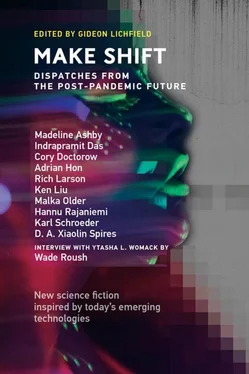“It isn’t? But everyone says—”
“There’s a lot of misrepresentation.” That understatement explained their entire century. “Yes, it would be gratifying if these interviews were to result in some breakthrough—and it would certainly help with our budget. But our agency was founded by people who lost parents, or other elders, and wished they had spent more time with them, learned more from them. There’s value in your stories even if there’s no monetary value in them.”
The old man’s voice was gruff. “My kids don’t want to spend any more time with me than they have to.”
And probably had good reason for that. “Maybe they will someday.” Or maybe they will just want to learn about you without having to spend time with you. “Or maybe it will be nephews or nieces, or kids from the neighborhood. Or, maybe a historian studying the time of your youth, or a novelist writing a story set there. Who knows? But I’ll tell you something.” Chela lowered her voice to indicate truth, or rather, a secret, which most people believed was like truth. “I think your first idea was right too. We don’t know what the next threat is going to be or what might help, but based on the last few, it seems prudent to collect as much knowledge as we can.”
“All right, all right.” And by the end of the interview Chela had that tired but satisfied feeling of difficult work well done. The old comemierda even thanked her at the end, sort of. “Nice to talk to you. Nice conversation. Brought up some things I’d forgotten.”
Then she settled down to the solitary part of her job, the paperwork and coding of the topics he’d mentioned, so that future researchers could dig information out of the transcripts. She set an alarm to check in on the old man in a week, see if he was still ornery or if he was ready for the idea of joining the Elder Resources network and getting regular pings from her. She didn’t have any other calls that day, but she messaged some of the other elders in her portfolio, and got satisfying replies: all well, all well, talk next week. And she thought about her mother.
Chela wasn’t even sure why she was so insistent on getting her mother’s story. Surely not because of some commitment to her organization and its principles. Nor was it some emotional existential question like Who is my father? (she had heard plenty about that man from her mother, none of it good.)
There weren’t gaps, exactly. But there was a difference between knowing the outline and understanding why things had happened and what they felt like. Why had her mother left the island and taken the huge and dangerous step of immigrating? What had it been like when she arrived? What had she thought when her new country convulsed around her? Had she ever imagined going back? She had asked these questions a few times, but her mother always changed the subject or plain ignored her.
Chela had trawled through traces of her mother on the Internet, in search of this elusive understanding of the woman who knew her better than anyone. But the pickings had been sparse. Her mother’s Facebook account was mainly postings picked up from other people (including several very debunked viral bits about what to post on your wall to prevent Facebook from invading your privacy in whatever sneaky new way, with comments below from a younger Chela explaining that they were both false and useless) and a few back-and-forths with childhood friends from the island that never went beyond “Cómo estás, amiga?,” “Bien y tú?,” “Todo bien, cuídate,” “Que Dios te bendiga.” She had a Twitter account briefly but had used it only to retweet Chela and her sisters before letting it trail off into disuse. No, although her mother was theoretically a member of the social media generation, she had never entrusted the Internet with her thoughts and feelings and the record of her selfhood.
Good , thought Chela. But also bad. There were no diaries, no journals, no baby books; some photos, yes, but not very many, and fewer still once cameras had gone digital and phones had been successively lost or broken.
Where was her mother’s life? Where were her memories?
Only in her mother’s brain and body.
Where no technology in the world could get to them.
ON TUESDAY CHELA GOT AN EMAIL STATING THAT BUDGETS, DIFFICULT TIMES, high demand, and so on meant that all Elder Liaisons would need to add one person their portfolios. She could almost hear all of her colleagues groaning in near-simultaneity. Except she couldn’t hear them because she’d only ever met five of them, and those only virtually. For all she knew, the email was a lie and not everyone’s workload would increase; maybe it applied only to her.
But either way, Chela wasn’t planning to quit her job over one more relationship; might as well get on with it. She spun her randomizer, watched the colors trickle by (technological frills for non-technological solutions, etc., etc.).
A woman. Sixty-two years old.
It was like a thump to the stomach, the surprise and burst of excitement, and Chela tried to calm herself. So unlikely. So unlikely. There were thousands, tens of thousands of interviewers. The great re-employment scheme , some senator had called it, as if that were a bad thing. (Chela did wonder how many of the interviewers had any research training or experience at all, but maybe she was wrong; there were an awful lot of out-of-work postgraduates out there).
She checked the location: Maryland. Her heart beat faster.
Nothing else in the data, nothing about how long she had lived there or where she had moved from, or her profession.
It was possible.
She sent a ping for an appointment, wondering if it would be her mother’s voice calling her back to ask if they could start right away (surely her mother, after delaying so long, would be eager to get started?). Did they distort the voices? She had never thought to ask.
But the response was a laconic text message suggesting a date and time, and Chela accepted with a feeling of unreality.
She called her mother, as usual, during her lunch break and had to hold her tongue gently between her teeth a couple of times as a reminder not to bring up interviews.
“How is everything?” her mother asked.
“Fine.” Chela peered at the bottom of the screen, trying to make out what her mother was eating. “Is that a salad?”
“Chicken salad.” Her mother waved the fork. “Fake chicken, ya tú sabes, this new stuff they say is so much better for you, with all the vitamins and no sé qué added.”
Chela fought down a burst of panic. If her mother had decided to eat healthy and suddenly given in to doing the interview, that suggested something about her state of mind. Or her body. “Everything okay with you?”
“Oh sure. Busy.”
“Nothing new, um…” How to ask? “Any reason you’re eating so sensibly?”
Her mother laughed. “No, hija, this was the special of the day, I figured I’d try it.” She made a face. “Fake meat. I can try it once.”
“And?”
Another mueca. “Fine.” In the not-fine sense, clearly. Chela sighed. One more technological solution failing in the face of personal preference and habitual behavior. She searched for another topic. Don’t ask her about doing an interview, you talked about it last week, it would be weird to bring it up again so soon, don’t mention interviews…
“How’s work?” her mother asked, and Chela jumped, but her mother’s eyes were on something else—another app? A telenovela playing in the back room of her shop where she ate?—and it was almost certainly a ritual question requiring only a ritual answer.
“Fine.” Not-fine. Her mother didn’t seem to notice.
Читать дальше












